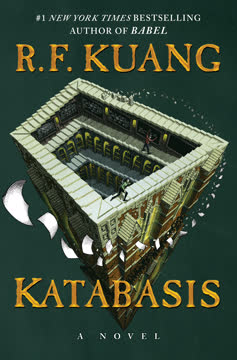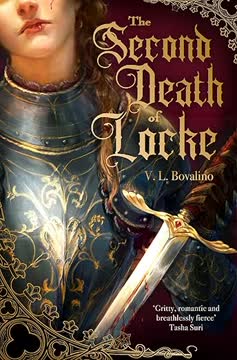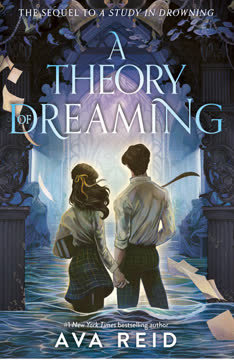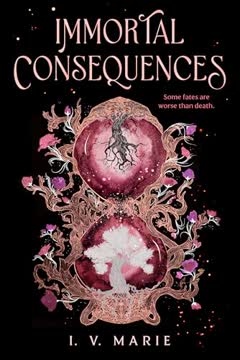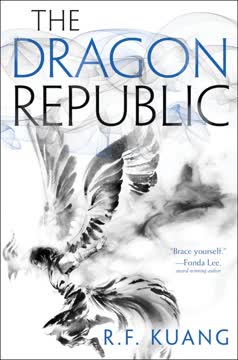Plot Summary
Descent for a Lost Soul
Alice Law, a driven Cambridge postgraduate in analytic magick, embarks on a desperate quest to rescue her advisor, Professor Jacob Grimes, whose gruesome death in a magical accident she blames on herself. Without Grimes, her academic future is doomed, so she resolves to descend into the Eight Courts of Hell to bargain for his soul. Peter Murdoch, her brilliant but infuriating rival, insists on joining her, revealing he too needs Grimes for his own reasons. Together, they perform a dangerous ritual, sacrificing half their lifespans to cross into the underworld. The journey is fraught with guilt, ambition, and the unspoken wounds of their complicated relationship, setting the stage for a metaphysical odyssey through the afterlife's shifting, perilous landscape.
The Viewing Pavilion's Lament
Upon arrival in Hell, Alice and Peter traverse the gray dunes and encounter the Viewing Pavilion—a liminal bridge where the dead can glimpse the living and vice versa. Here, they witness their colleagues above, piecing together their disappearance, and are reminded of the impossibility of simply returning. The Pavilion is a place of longing and regret, where ghosts haunt the living not out of malice, but a desperate desire to be remembered and included. The journey through the Pavilion underscores the pain of separation and the irreversibility of their choice, as well as the haunting presence of unfinished business and the ache of being left behind.
Undergraduates and Unfinished Business
In the Fields of Asphodel, Alice and Peter search for Grimes among the recently dead, but instead encounter the Shades of four undergraduates who perished decades ago in a magical accident under Grimes's supervision. These tragic figures, locked in the moment of their deaths, are paralyzed by fear of reincarnation and the loss of their intellectual identities. Their presence forces Alice and Peter to confront the moral ambiguities of academic ambition, the terror of mediocrity, and the cost of clinging to past glories. The undergraduates' refusal to move on mirrors the living's own paralysis, and their questions about the value of life and knowledge echo throughout the journey.
The Wall of Bones
To progress deeper into Hell, Alice and Peter must scale a massive wall constructed from the bones of the dead—a physical and psychological trial. The climb exposes their vulnerabilities: Peter's fear of heights and Alice's exhaustion and self-doubt. Their mutual dependence is laid bare as they help each other through panic and pain, but the wall also symbolizes the barriers between them—pride, rivalry, and unspoken history. At the summit, they glimpse the shifting, surreal topography of Hell, a landscape that resists mapping and certainty, foreshadowing the non-Euclidean, paradoxical nature of the trials ahead.
Rivalry and Regret
As they camp beneath the wall, Alice and Peter's simmering rivalry erupts. They trade barbs about fellowships, past slights, and the elusive approval of Grimes. Their conversation reveals the toxic dynamics of academic ambition, the hunger for validation, and the wounds inflicted by favoritism and exclusion. Both are haunted by what they've lost and what they've sacrificed to reach this point. Yet, in their shared vulnerability, a fragile truce forms, hinting at the possibility of reconciliation and mutual understanding, even as the path ahead grows darker and more uncertain.
The Library of Pride
The First Court of Hell manifests as a grand, infinite library where souls are condemned to define "the good" through endless study and debate. Here, Alice and Peter meet the Shade of George Edward Moore, who guides them through the petty sins of pride and academic arrogance. The library is a place of frustration, where logic and reason become traps, and the pursuit of knowledge devolves into self-justification and paralysis. Alice's realization that Grimes is not here—his sins are of a different order—propels them onward, but not before they are reminded of the dangers of intellectual hubris and the futility of seeking certainty in an ambiguous world.
The River Lethe's Temptation
At the banks of the Lethe, the river of forgetfulness, Alice is nearly seduced by the promise of oblivion. The river's waters offer release from pain, memory, and self, and the guardian Meng Po beckons her to drink and be at peace. Peter's intervention—anchoring her with reminders of her identity—saves her from dissolution. The episode crystallizes the central tension between the desire to forget and the necessity of memory, between the comfort of erasure and the courage to endure. The Lethe is both a mercy and a threat, a symbol of the price of moving on and the cost of holding on.
The Court of Desire
The Second Court, Desire, appears as a student center filled with Shades trapped in compulsive, self-indulgent loops—addicts of pleasure, sex, food, and validation. Alice and Peter are repulsed and unsettled, forced to confront their own desires and the ways in which academia demands the denial of bodily needs. The court is a mirror of their own asceticism and the shame attached to wanting. Their encounter with the court's temptations and the bone-things that attack them underscores the dangers of both excess and repression, and the violence that can erupt when desire is denied or left unchecked.
The Bone-Things' Pursuit
As they journey onward, Alice and Peter are hunted by bone-things—magically animated skeletal creatures, the creations of the Kripkes, legendary magicians who have become monstrous in their quest for power. The bone-things are immune to ordinary magick, forcing Alice and Peter to rely on wit, courage, and the dangerous waters of the Lethe to survive. The encounter reveals the presence of other, more dangerous sojourners in Hell, and the lengths to which magicians will go to achieve their ends. The threat of the Kripkes looms, a warning of what happens when the pursuit of knowledge becomes all-consuming.
Confessions and Consequences
In the aftermath of violence, Alice and Peter confess their secrets: the tattoo Grimes inscribed on Alice, granting her perfect memory at a terrible cost; Peter's complicity in Grimes's death and his own chronic illness. Their confessions are acts of vulnerability and self-reckoning, exposing the wounds inflicted by ambition, abuse, and the relentless demands of academia. The exchange is both cathartic and destabilizing, as they grapple with the impossibility of absolution and the necessity of moving forward. The chapter is a meditation on the price of knowledge, the burden of memory, and the hope of redemption.
The Weaver Girl's Dilemma
At the border of Greed and Wrath, Alice and Peter encounter the Weaver Girl, a deity who offers them a shortcut in exchange for a test of loyalty—a magical prisoner's dilemma. Each must choose whether to go on together or alone, with the risk of betrayal and oblivion. The test exposes the fractures in their relationship, as suspicion and fear override trust. Alice, paralyzed by doubt and the memory of Peter's notes on exchange, chooses self-preservation, dooming Peter to the Weaver Girl's wrath. The episode is a devastating exploration of trust, betrayal, and the difficulty of choosing vulnerability over self-defense.
The Escher Trap
Separated and desperate, Alice and Peter are ensnared by the Kripkes in an Escher-inspired trap—a pit of endless, looping stairs from which there is no escape. The trap is a physical manifestation of logical paradox, a place where reason fails and hope dwindles. As they languish, they confess the full truth of their actions: both are responsible for Grimes's death, both are haunted by guilt and the impossibility of forgiveness. The only way out is through sacrifice, and Peter, using the Hangman's Paradox, engineers Alice's escape at the cost of his own life. The chapter is a meditation on the limits of logic, the necessity of grace, and the pain of letting go.
The Price of Memory
Alone, Alice wanders the wastelands of Lower Hell, stripped of her magical tattoo and the burden of perfect memory. She is numb, emptied of purpose, and haunted by the loss of Peter. The Rebel Citadel, a haven for those who refuse to move on, offers only stasis and despair. Alice is forced to confront the futility of waiting for meaning, the agony of time without change, and the necessity of choosing life in the face of emptiness. Her journey becomes a search for a reason to go on, a struggle to find hope in a world that offers none.
The Rebel Citadel
Within the Rebel Citadel, Alice encounters Gertrude and the community of souls who have chosen to resist reincarnation, building a city of defiance and waiting for the end of the world. The citadel is a place of beauty and emptiness, a monument to the refusal to change. Alice is tempted by the promise of rest, but the stifling stillness and the agony of unending time drive her to flee. The citadel is a warning against the allure of false paradises and the danger of mistaking stasis for peace.
The Kripkes' Domain
Hunted by the Kripkes and their bone-things, Alice is forced to fight for her life. She uses her wits, magick, and the lessons of paradox to outmaneuver her pursuers, culminating in a brutal confrontation that leaves her bloodied but victorious. The battle is a test of will, ingenuity, and the refusal to be a victim. In defeating the Kripkes, Alice reclaims agency and the right to shape her own fate, but the cost is high—violence, loss, and the knowledge that survival is never guaranteed.
The True Contradiction
Elspeth, the Shade who once saved Alice, returns and gifts her the Dialetheia—a True Contradiction, the key to bargaining with the Lord of Hell. The gift is an act of inexplicable grace, a reminder that not all debts must be repaid and that kindness can exist even in the darkest places. With the Dialetheia in hand, Alice is finally able to approach the throne of Yama, armed not only with power but with the hard-won wisdom of her journey. The chapter is a celebration of generosity, the hope of transformation, and the courage to accept help.
The Throne of Yama
At the throne of King Yama, Alice presents the Dialetheia and bargains for her and Peter's return to life. She confronts Grimes one last time, refusing his offer of eternal research and choosing instead the messy, finite world of the living. The exchange is both literal and symbolic—a rejection of the false promises of immortality and the embrace of imperfection, vulnerability, and love. With Yama's blessing, Alice and Peter ascend the staircase back to the world above, transformed by their ordeal and ready to begin anew.
Return to the Living
Alice and Peter emerge from Hell into the starlit gardens of Cambridge, hand in hand, forever changed. The world is brighter, more vivid, and full of possibility. The wounds of the past remain, but they are tempered by forgiveness, understanding, and the hope of a future together. The journey through Hell has stripped them of illusions, pride, and the need for certainty, leaving only the essential: the will to live, to love, and to make meaning in a world that is always incomplete. Their story ends not with answers, but with the promise of new beginnings.
Characters
Alice Law
Alice is a postgraduate student at Cambridge, specializing in analytic magick. Driven by guilt over her advisor's death and a desperate need for academic validation, she is both brilliant and brittle, her self-worth bound to achievement and approval. Alice's psyche is marked by trauma—her perfectionist upbringing, the toxic mentorship of Grimes, and the scars of academic rivalry. Her magical tattoo, granting perfect memory, is both a gift and a curse, symbolizing the burden of never being able to forget pain or failure. Throughout her journey, Alice is forced to confront her complicity, her capacity for cruelty, and her longing for connection. Her arc is one of hard-won self-acceptance, the relinquishing of pride, and the embrace of vulnerability and love.
Peter Murdoch
Peter is Alice's academic rival and reluctant companion in Hell. A prodigy from a family of scholars, he is effortlessly brilliant but emotionally guarded, hiding chronic illness and insecurity behind a facade of geniality. Peter's relationship with Alice is fraught—rivalry, attraction, and mutual misunderstanding intertwine, fueled by the toxic dynamics of their department and the manipulations of Grimes. Peter's guilt over Grimes's death and his own failures drives him to self-sacrifice, culminating in his willingness to trade his life for Alice's. His arc is one of humility, honesty, and the courage to accept love and forgiveness.
Professor Jacob Grimes
Grimes is the legendary chair of analytic magick at Cambridge, a figure of immense intellect and influence. To his students, he is both a gatekeeper and a tormentor, dispensing praise and cruelty with equal caprice. Grimes's mentorship is toxic—he exploits, manipulates, and discards those who fail to meet his impossible standards. His death is the catalyst for the novel's events, and his presence haunts Alice and Peter throughout their journey. In Hell, Grimes is revealed as a soul unwilling to change, clinging to pride and the pursuit of knowledge at any cost. He embodies the dangers of unchecked ambition and the failure to recognize one's own humanity.
Elspeth Bayes
Elspeth is the Shade of a former Grimes student who died by suicide and has lingered in Hell for decades. She is a survivor, navigating the underworld with resourcefulness and wit, her boat the Neurath a haven for lost souls. Elspeth's kindness and generosity are acts of resistance against the cruelty of Hell—she saves Alice and Peter, gifts Alice the Dialetheia, and ultimately chooses to move on. Her arc is one of acceptance, the letting go of old wounds, and the embrace of grace.
The Kripkes (Nicomachus, Magnolia, Theophrastus)
Once celebrated magicians, the Kripkes have become the apex predators of Hell, sacrificing their humanity in pursuit of the "Great Quest"—the search for a True Contradiction. Their bone-things terrorize the courts, and their willingness to kill and exploit others is a warning of what happens when the pursuit of knowledge becomes all-consuming. The family's dynamic—parents and child, bound together in undeath—is both horrifying and pitiable, a distorted mirror of academic ambition and familial loyalty.
John Gradus
Gradus is a Shade who guides Alice through Lower Hell, his identity slippery and undefined. He is obsessed with the question of why souls persist in existence, unable to move on or die. Gradus is both a trickster and a confidant, alternately helping and hindering Alice. His arc is one of resignation, but also of hope—he ultimately finds release through Alice's example, boarding the ship across the Lethe.
Gertrude
Gertrude is the architect of the Rebel Citadel, a haven for those who refuse reincarnation and choose to wait for the end of the world. She is fiercely intelligent, skeptical, and committed to the idea of building a new order in Hell. Gertrude's philosophy is one of resistance, but also of stasis—her refusal to change becomes its own form of damnation. She is both a mentor and a warning to Alice.
Archimedes
The department cat, Archimedes, is a liminal figure—able to cross boundaries between life and death, guiding Alice and Peter through the courts. He is a symbol of survival, adaptability, and the persistence of life in the face of oblivion. Archimedes's presence is a comfort and a reminder of the world above.
The Weaver Girl
A deity from myth, the Weaver Girl offers Alice and Peter a shortcut in exchange for a test of loyalty. Her challenge—a magical prisoner's dilemma—exposes the fragility of trust and the pain of betrayal. She is both a tempter and a judge, her own story of loss and longing echoing the novel's themes of love and separation.
King Yama (Lord of Hell)
King Yama is the ruler of the underworld, a figure of cosmic authority and inscrutable mercy. He presides over the final court, weighing the souls of the dead and granting boons to those who bring him the True Contradiction. Yama is both terrifying and compassionate, embodying the paradoxes of justice and grace. His presence is the novel's final test—a confrontation with the limits of power, the necessity of choice, and the possibility of redemption.
Plot Devices
Paradox as Structure and Theme
The novel is built on the logic and language of paradox—magical, philosophical, and emotional. The journey through Hell is structured as a series of courts, each embodying a different sin or logical conundrum. Paradoxes are both the tools of magick and the traps that ensnare the characters: the Sorites Paradox, the Liar Paradox, Zeno's Paradoxes, the Hangman's Paradox, and the True Contradiction (Dialetheia) all serve as both plot mechanisms and metaphors for the characters' psychological struggles. The narrative itself is non-linear, shifting between memory, dream, and reality, mirroring the instability of the underworld and the unreliability of self-knowledge. Foreshadowing is woven through recurring motifs—chalk, bones, rivers, and doors—each signaling the permeability of boundaries and the inevitability of change. The structure is recursive, with events and relationships looping back on themselves, forcing the characters to confront their own complicity, guilt, and the impossibility of closure. The ultimate resolution—bargaining with Yama using the True Contradiction—embodies the novel's central insight: that meaning, forgiveness, and freedom are found not in certainty, but in the acceptance of ambiguity, imperfection, and the grace of exception.
Analysis
"Katabasis" is a dazzling, erudite meditation on the costs of ambition, the wounds of academia, and the search for meaning in a world defined by paradox and loss. R.F. Kuang reimagines the descent into the underworld as both a literal and psychological journey, using the language of logic, magick, and myth to explore the trauma of toxic mentorship, the hunger for validation, and the pain of memory. The novel is a scathing critique of academic culture—its hierarchies, rivalries, and abuses—while also celebrating the beauty of intellectual discovery and the possibility of genuine connection. At its heart, "Katabasis" is about the courage to choose life in the face of despair, to accept the limits of knowledge, and to find grace in imperfection. The lessons are hard-won: that survival is not the same as stasis, that forgiveness is an ongoing process, and that love—messy, uncertain, and incomplete—is the only force capable of breaking the cycle of pride, cruelty, and self-destruction. In a world where every system is incomplete and every story unfinished, Kuang offers not answers, but the hope of new beginnings, the promise that even in Hell, one can choose to live.
Last updated:
FAQ
Synopsis & Basic Details
What is Katabasis about?
- A Desperate Academic Quest: Katabasis follows Alice Law, a brilliant but guilt-ridden Cambridge postgraduate in analytic magick, as she descends into the Eight Courts of Hell to retrieve the soul of her deceased advisor, Professor Jacob Grimes. Her academic future hinges on his return, as she blames herself for his gruesome death in a magical accident.
- A Reluctant Partnership: Alice is unexpectedly joined by Peter Murdoch, her equally brilliant but often infuriating academic rival, who also has compelling, though initially mysterious, reasons to bring Grimes back. Their journey through the underworld is a perilous odyssey filled with philosophical puzzles, mythological encounters, and confrontations with their own pasts and the toxic academic culture they inhabit.
- A Deeper Search for Meaning: Beyond the immediate goal of rescuing Grimes, the narrative explores themes of ambition, guilt, memory, and identity. As Alice and Peter navigate Hell's shifting landscapes and encounter its diverse inhabitants, they are forced to confront the true costs of their academic pursuits and the complex, often painful, nature of their relationship.
Why should I read Katabasis?
- Intellectual Thrill Ride: Katabasis offers a unique blend of dark fantasy and philosophical inquiry, using complex logical paradoxes and mythological allusions to drive its plot. Readers who enjoy intellectually stimulating narratives that challenge their perceptions of reality, morality, and the human condition will find it deeply rewarding.
- Profound Emotional Depth: Beneath its intricate plot, the novel delves into the raw emotional landscape of its characters, exploring themes of trauma, ambition, and the search for genuine connection. The evolving relationship between Alice and Peter, fraught with rivalry and unspoken affection, provides a compelling emotional core that resonates long after the final page.
- A Scathing Critique of Academia: R.F. Kuang delivers a sharp, incisive critique of the pressures, hierarchies, and toxic dynamics within elite academic institutions. The novel exposes the psychological toll of relentless competition, abusive mentorship, and the often-illusory promise of intellectual validation, making it highly relevant for anyone familiar with or curious about the darker side of academia.
What is the background of Katabasis?
- A World of Analytic Magick: The story is set in a contemporary world where "analytic magick" is a recognized academic discipline, particularly at prestigious institutions like Cambridge. This form of magick relies on linguistic trickery, logical paradoxes, and mathematical principles, using chalk inscriptions to temporarily suspend or reinterpret natural laws.
- Mythological Underpinnings: The narrative draws heavily from diverse underworld mythologies, including Greek (Hades, Lethe, Erinyes), Roman (Aeneas), and East Asian (King Yama, Meng Po, Chinese Buddhist Hells). These intertextual references enrich the world-building, providing a rich tapestry of beliefs and traditions that shape the characters' understanding of the afterlife.
- Philosophical and Literary Allusions: The book is steeped in philosophical concepts and literary allusions, from Plato and Aristotle to Nietzsche, Kant, and Derek Parfit. These references are not merely decorative but are integral to the plot, with paradoxes like Sorites, Liar, and Hangman's Paradoxes serving as both magical tools and thematic anchors for the characters' psychological journeys.
What are the most memorable quotes in Katabasis?
- "Magick, the most mysterious and capricious of disciplines, admired for its power, derided for its frivolity, is in brief the act of telling lies about the world." (Chapter 1): This quote encapsulates the novel's core premise about the nature of magick, framing it as a deliberate act of deception that challenges reality. It highlights the inherent paradox of the discipline and foreshadows the characters' own struggles with truth and illusion, both in their magical practice and their personal lives.
- "The world will be much easier for him... You will always have to perform twice as well for half the acclaim. You have no room for mistakes." (Chapter 13): Professor Grimes's brutal assessment of Alice's academic prospects compared to Peter's reveals the deep-seated sexism and systemic biases within academia. This quote underscores Alice's lifelong struggle for recognition and the immense pressure she faces, explaining much of her ambition and self-worth tied to external validation.
- "You don't realize that nature knows you're lying. You draw your little circles, and we bend and pretend, the same way parents pretend when their toddlers lie." (Chapter 34): King Yama's revelation about the true nature of magick profoundly recontextualizes the entire discipline. It suggests that the universe isn't fooled by human spells but rather indulges them, implying a cosmic benevolence or indifference that challenges the magicians' perceived power and hubris.
What writing style, narrative choices, and literary techniques does R.F. Kuang use?
- Erudite and Incisive Prose: Kuang employs a sharp, intellectual prose style, rich with philosophical terminology and academic jargon, reflecting the characters' scholarly backgrounds. This creates an immersive experience for readers, drawing them into the intellectual world of analytic magick while maintaining a compelling narrative pace.
- Non-Linear and Fragmented Narrative: The story frequently shifts between present-day events in Hell and flashbacks to Alice's past at Cambridge, often triggered by sensory details or emotional cues. This non-linear structure mirrors Alice's fragmented memory and psychological state, gradually revealing hidden truths and motivations that deepen the reader's understanding of her character.
- Symbolism and Metaphor: The novel is heavily reliant on symbolism and metaphor, with recurring motifs like chalk, bones, rivers, and doors carrying significant thematic weight. Hell itself is a grand metaphor for the characters' internal struggles, and its shifting landscape reflects their psychological states, making the setting an active participant in their emotional journeys.
Hidden Details & Subtle Connections
What are some minor details that add significant meaning?
- Archimedes's Unexplained Presence: The department cat, Archimedes, appears in Hell without explanation, often acting as an intuitive guide or a barometer of danger. His ability to cross boundaries and his seemingly unbothered demeanor in the underworld (Chapter 2, 8, 9, 25) subtly hints at the porous nature of reality and the idea that some beings exist outside the strictures of human logic and death, foreshadowing the novel's ultimate embrace of exceptions and unknowable grace.
- The Shifting Nature of Hell's Landscape: Alice initially expects a fixed, mappable Hell, but its topography constantly changes (Chapter 2, 3, 5). This fluidity is not just a fantastical element but symbolizes the subjective nature of punishment and the psychological state of its inhabitants. The fact that Hell "adapts to us" (Chapter 5) means its horrors are often reflections of the characters' internal worlds, making their journey a confrontation with their own minds.
- The "Home is where the heart is" Mat: Elspeth's discovery of a mat with this inscription in the hold of her boat (Chapter 18) is a poignant detail. In a realm where souls are stripped of their earthly attachments and identities, this seemingly mundane object serves as a subtle reminder of the enduring human need for belonging and emotional anchors, contrasting with the intellectual pursuits that often lead characters astray.
What are some subtle foreshadowing and callbacks?
- Peter's "Pizza Anus" Map: Peter's initial, seemingly silly description of Hell's layout as a "pizza anus" (Chapter 5) is a subtle foreshadowing of the non-Euclidean geometry of Hell. While Alice dismisses it, Elspeth later confirms that Hell is indeed a "projective plane" (Chapter 33), a hyperbolic space where "the inside is continuous with the outside." This validates Peter's intuitive understanding and highlights the limitations of Alice's more rigid, linear thinking.
- The Disappearing Books from the Library: Early in the narrative, Alice notes that several crucial books on Tartarology have been disappearing from the Cambridge library (Chapter 1). This seemingly minor inconvenience is later revealed to be Peter's doing, as he was researching the same journey. This callback subtly establishes Peter's hidden competence and his parallel, yet secret, efforts to rescue Grimes, setting up the later revelation of his own guilt and sacrifice.
- The Cuckoo Clock's Persistent Call: The cuckoo clock in the Escher trap (Chapter 23) serves as a recurring auditory motif. Its "cuck-oo" call, initially a reminder of dwindling time and wasted effort in the Cambridge lounge, becomes a signal for the Kripkes, alerting them to their prey. This transformation of a mundane sound into a harbinger of doom subtly underscores the Kripkes' insidious nature and their ability to weaponize everyday objects within Hell.
What are some unexpected character connections?
- Elspeth Bayes and Professor Grimes's Shared Past: Elspeth, the boatman, is revealed to be a former advisee of Professor Grimes who died by suicide (Chapter 15). This connection is unexpected and deeply significant, as it provides Alice with a living (or rather, undead) example of the long-term consequences of Grimes's toxic mentorship. Elspeth's story serves as a chilling mirror to Alice's own struggles, highlighting the cyclical nature of academic abuse and the profound impact it has on students.
- John Gradus's Existential Crisis: John Gradus, Alice's guide through Dis, is initially presented as a cynical, almost indifferent Shade. However, his deep-seated existential crisis—his inability to find a reason to "go on" or to die (Chapter 30)—reveals a profound vulnerability. This unexpected depth connects him to Alice's own struggles with purpose and meaning, showing that even in Hell, souls grapple with universal questions of existence, and that his callousness is a defense mechanism.
- The Kripkes' Familial Bond: The Kripkes, the monstrous magicians of Hell, are revealed to be a family unit—Nicomachus, Magnolia, and their son Theophrastus (Chapter 15). This unexpected familial connection adds a tragic dimension to their villainy, suggesting that their monstrousness stems from a desperate, misguided attempt to keep their family together, even in undeath. It subverts the expectation of purely evil antagonists, hinting at the complex motivations behind their actions.
Who are the most significant supporting characters?
- Elspeth Bayes: The Compassionate Survivor: Elspeth is crucial as a foil and mentor to Alice. Her past as a Grimes advisee who committed suicide offers a stark warning about the dangers of academic pressure and toxic mentorship, directly mirroring Alice's own experiences. Her unexpected kindness and the gift of the Dialetheia (Chapter 32) represent a profound act of grace and a counterpoint to the pervasive cruelty of Hell, demonstrating that even in despair, generosity can exist.
- John Gradus: The Existential Guide: Gradus, Alice's guide through Dis, is significant not just for his knowledge of Lower Hell but for his philosophical struggle with the meaning of existence. His cynical yet deeply personal quest to understand why souls persist (Chapter 30) forces Alice to confront her own motivations for living, pushing her beyond her initial quest for Grimes and towards a deeper self-reckoning. His eventual release across the Lethe, inspired by Alice, underscores the transformative power of their interaction.
- Archimedes: The Unconventional Companion: The department cat, Archimedes, serves as more than just a pet; he is a liminal being capable of traversing the boundaries between worlds (Chapter 25). His loyalty, unexpected appearances, and ability to sense danger make him a silent guardian and a symbol of intuitive wisdom. His presence offers Alice comfort and a tangible link to the living world, reminding her of the simple, non-academic attachments that ground her humanity.
Psychological, Emotional, & Relational Analysis
What are some unspoken motivations of the characters?
- Alice's Desire for Grimes's Approval: Beyond securing her academic future, Alice's deepest unspoken motivation is a desperate craving for Professor Grimes's validation and affection. Her willingness to endure his abuse, her pride in being his "favorite," and her fantasy of him saying "good job" (Chapter 21) reveal a profound emotional wound stemming from a need for paternal approval, which she projects onto her mentor. This drives her initial quest and colors her perception of his actions.
- Peter's Fear of Pity and Inadequacy: Peter's chronic illness (Crohn's disease) and his childhood experience of being pitied (Chapter 22) fuel an unspoken fear of appearing weak or incapable. This motivates his relentless pursuit of academic excellence and his carefully constructed facade of effortless genius. His decision to hide his illness from Alice and his initial reluctance to reveal his vulnerability stem from a deep-seated need to be seen as strong and competent, rather than an "invalid."
- Grimes's Pursuit of Immortality through Knowledge: Professor Grimes's relentless drive for groundbreaking research, even at the expense of his students, is implicitly a quest for a form of immortality. His belief that "the life of a scholar is mere training for dying" (Chapter 34) and his desire to "dance through the hidden world" with Alice suggest a profound fear of oblivion, which he seeks to overcome by transcending the limitations of the body through pure intellect and magical discovery.
What psychological complexities do the characters exhibit?
- Alice's Self-Blame and Guilt: Alice exhibits a complex interplay of self-blame and externalized anger. She internalizes Grimes's abuse, believing his mistreatment is her fault for not being "enough" (Chapter 20), yet simultaneously harbors deep resentment. Her confession of killing Grimes (Chapter 23) is a manifestation of this guilt, even as Peter reveals her innocence. This psychological complexity highlights the insidious nature of gaslighting and the difficulty of disentangling self-worth from external validation.
- Peter's Mask of Indifference: Peter's charming, absent-minded persona is a sophisticated psychological defense mechanism. His "manic state" (Chapter 13) and tendency to "ramble until he forgot what had gotten him started" (Chapter 2) are not just quirks but ways to deflect deeper emotional engagement. This mask allows him to navigate social situations without revealing his chronic pain or the profound insecurity that stems from his illness, making him appear invulnerable while secretly suffering.
- Elspeth's Numbness and Resignation: Elspeth's decade in Hell has led to a profound psychological numbness, where "there was no difference between pain and pleasure. It was all just the same wash" (Chapter 16). This state of resignation is a coping mechanism against the trauma of her suicide and the futility of her existence. Her ability to "cohere unconsciously" as a Shade (Chapter 16) reflects a detachment from her physical self, a psychological complexity born from prolonged suffering and the desire for peace.
What are the major emotional turning points?
- Alice's Near-Drowning in the Lethe: Alice's near-succumbing to the Lethe's allure (Chapter 7) is a critical emotional turning point. It reveals her deep-seated desire for oblivion and release from the burdens of memory and guilt. Peter's desperate intervention, forcing her to recall her identity, marks the first moment of genuine, unselfish connection between them, laying the groundwork for their later confessions and reconciliation.
- Alice and Peter's Mutual Confessions: The raw, honest exchange of their deepest secrets—Alice's tattoo and Grimes's abuse, Peter's illness and Grimes's plagiarism (Chapter 10, 21, 22)—is a major emotional turning point. This mutual vulnerability shatters their carefully constructed facades, allowing them to see each other not as rivals but as fellow victims of a toxic system, forging a bond of empathy and understanding that transcends their past animosity.
- Peter's Sacrifice in the Escher Trap: Peter's decision to sacrifice himself for Alice using the Hangman's Paradox (Chapter 23) is the emotional climax of their journey. This act of selfless love, driven by his guilt and his desire for Alice to live, profoundly impacts Alice, forcing her to confront the depth of his affection and the true cost of her own self-preservation. It transforms her grief into a fierce resolve, shifting her purpose from rescuing Grimes to honoring Peter's sacrifice.
How do relationship dynamics evolve?
- From Bitter Rivals to Reluctant Allies: Alice and Peter's relationship begins as a tense academic rivalry, fueled by competition for Grimes's approval and their own insecurities (Chapter 1, 5). Their shared journey through Hell forces them into a reluctant alliance, where mutual dependence slowly erodes their animosity, particularly during physical challenges like climbing the Wall of Bones (Chapter 4).
- From Guarded Strangers to Confidantes: The emotional toll of Hell and the constant threat of death gradually break down their emotional barriers. Their confessions about Grimes's abuse, Peter's illness, and Alice's tattoo (Chapter 10, 21, 22) transform them into confidantes, revealing a depth of understanding and empathy that neither had anticipated. This shift is marked by moments of shared vulnerability and genuine concern.
- From Unspoken Affection to Explicit Love: The underlying attraction and care between Alice and Peter, initially masked by rivalry and awkwardness, evolves into explicit love. Peter's self-sacrifice (Chapter 23) and Alice's subsequent grief and determination to save him (Chapter 25) solidify their bond. Their reunion at King Yama's throne, marked by physical embrace and shared laughter (Chapter 35), culminates in an open acknowledgment of their love, transforming their relationship into a source of strength and hope for the future.
Interpretation & Debate
Which parts of the story remain ambiguous or open-ended?
- The True Nature of Hell's Justice: While characters like Elspeth and Gradus offer theories on Hell's purpose (e.g., karma as a seed, punishment as a reflection of desire), the ultimate mechanism of its justice remains ambiguous. King Yama's statement that "Hell has no rules" (Chapter 34) suggests an arbitrary or inscrutable system, leaving readers to debate whether the suffering is truly retributive, rehabilitative, or simply a cosmic game played by indifferent deities.
- The Extent of Alice's Memory Loss: After her immersion in the Lethe and the fading of her tattoo (Chapter 32), Alice claims to have "enough" memory, but the precise extent of what she has lost remains unclear. The narrative implies a selective erasure, but the long-term psychological impact of this loss, and whether it truly frees her from past trauma or simply creates new gaps, is left open to interpretation.
- The Future of Alice and Peter's Academic Careers: While Alice and Peter return to the living, their academic futures are uncertain. They have sacrificed years of their lives, potentially lost their funding, and alienated their department. The question of whether they can truly escape the toxic academic cycle they sought to flee, or if they will find a new path together, remains an open-ended challenge for their post-Hell existence.
What are some debatable, controversial scenes or moments in Katabasis?
- Alice's Complicity in Grimes's Death: The revelation that Alice intentionally left the pentagram flawed, leading to Grimes's death (Chapter 1), is highly controversial. While Peter later reveals he removed the crucial component, Alice's initial intent and her subsequent guilt spark debate about the nature of culpability, the difference between killing and letting die, and the psychological impact of abuse on a victim's actions.
- The Weaver Girl's Prisoner's Dilemma: The Weaver Girl's test of loyalty (Chapter 11), which forces Alice and Peter to choose between cooperation and betrayal, is a morally ambiguous scene. Alice's choice to save herself, driven by suspicion and fear, leads to Peter's capture. This moment provokes debate about the ethics of self-preservation, the fragility of trust, and whether Alice's actions were a rational response to perceived betrayal or a moral failing.
- Grimes's Final Offer to Alice: At King Yama's throne, Grimes attempts to lure Alice into eternal research in Hell, promising her "unlimited research funding" and "no doors will ever be closed to you again" (Chapter 34). This offer, coming from her abuser, is deeply controversial. It forces Alice to confront the allure of the very system that harmed her, and readers may debate whether her ultimate rejection is a triumph of self-worth or a missed opportunity for a different kind of power.
Katabasis Ending Explained: How It Ends & What It Means
- The Sacrifice and the Exchange: The Katabasis ending explained reveals that Peter Murdoch sacrifices himself in the Escher trap, using the Hangman's Paradox to ensure Alice's escape. He is captured and his soul is drained by the Kripkes. Alice, driven by grief and a newfound purpose,
Review Summary
Katabasis has received mixed reviews, with many praising its dark academia setting, complex characters, and exploration of philosophical themes. Readers appreciate the intricate worldbuilding and the rivals-to-lovers dynamic between Alice and Peter. Some critics find the pacing slow and the exposition heavy, while others enjoy the intellectual depth. The journey through hell is described as both captivating and occasionally tedious. Overall, fans of Kuang's previous works and those who enjoy thought-provoking fantasy are excited for its release.
Similar Books
Download PDF
Download EPUB
.epub digital book format is ideal for reading ebooks on phones, tablets, and e-readers.
